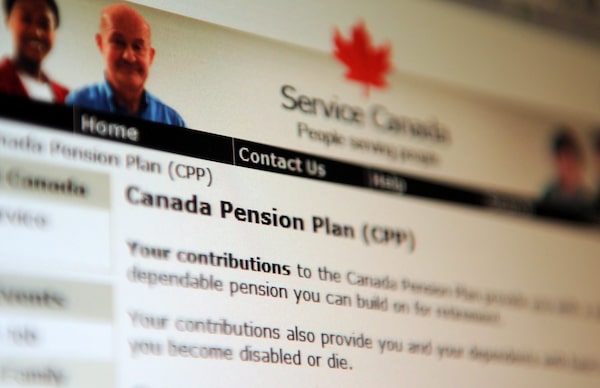
The Canada Pension Plan Investment Board earned a net return of 1.3 per cent in its latest fiscal year as inflation and rising interest rates weighed on both stock and fixed-income markets.Sean Kilpatrick/The Canadian Press
Canada Pension Plan Investment Board reported a 1.3-per-cent return in its last fiscal year as gains from private investments helped offset weak performance from public stocks and bonds.
The plan’s modest results beat a composite benchmark it uses to measure its performance, which gained 0.1 per cent in the fiscal year that ended March 31.
Over 10 years, CPPIB’s investments have returned 10 per cent, compared with 10.8 per cent a year earlier.
CPPIB’s total assets increased to $570-billion, from $539-billion at the end of the previous fiscal year, with $8-billion of investing profits adding to $23-billion in net transfers from the Canada Pension Plan.
The CPP is the primary national retirement program for working Canadians, and CPPIB has managed the plan’s money since 1999.
Last year, a number of large pension-plan investors wrestled with difficult conditions in public markets as high inflation and rapidly rising interest rates combined to drive a rare simultaneous dive in public equities and fixed income markets.
Those trends weighed on CPPIB last fiscal year, where public equities and fixed income investments make up a combined 36 per cent of its portfolio. But over time, CPPIB has balanced its portfolios of public stocks and bonds with investments in real estate, infrastructure, private equity and other specialized investments that have helped insulate it against recent volatility in public markets.
Fixed-income investments lost 0.8 per cent last year, and have now returned just 0.8 per cent over five years for CPPIB.
Public equities, which are traded on stock exchanges, gained 0.3 per cent in the fiscal year.
Real estate investments also had a tough year with a loss of 1.2 per cent. Weak results from retail assets were driven by a shift to e-commerce, and office assets suffered as hybrid working trends take hold, but logistics assets performed better.
By contrast, private equity returned 6.8 per cent, credit investments gained 6 per cent, and infrastructure investments – which often perform well when inflation rises – were up 5.6 per cent.
“Despite significant declines in global equity and fixed income markets during our fiscal year, our investment portfolio remained resilient,” chief executive officer John Graham said in a news release.
Over a five-year span, all of CPPIB’s asset classes have generated positive investment returns.
The depreciating Canadian dollar also proved to be a tailwind for CPPIB’s investment returns, adding a $25-billion foreign currency gain in the quarter.
In the fiscal year, CPPIB’s operating expenses increased by $112-million as it hired more staff and invested in technology and data infrastructure. But its costs are relatively steady over five years when measured as a percentage of its assets, at an average of 0.29 per cent.
 James Bradshaw
James Bradshaw